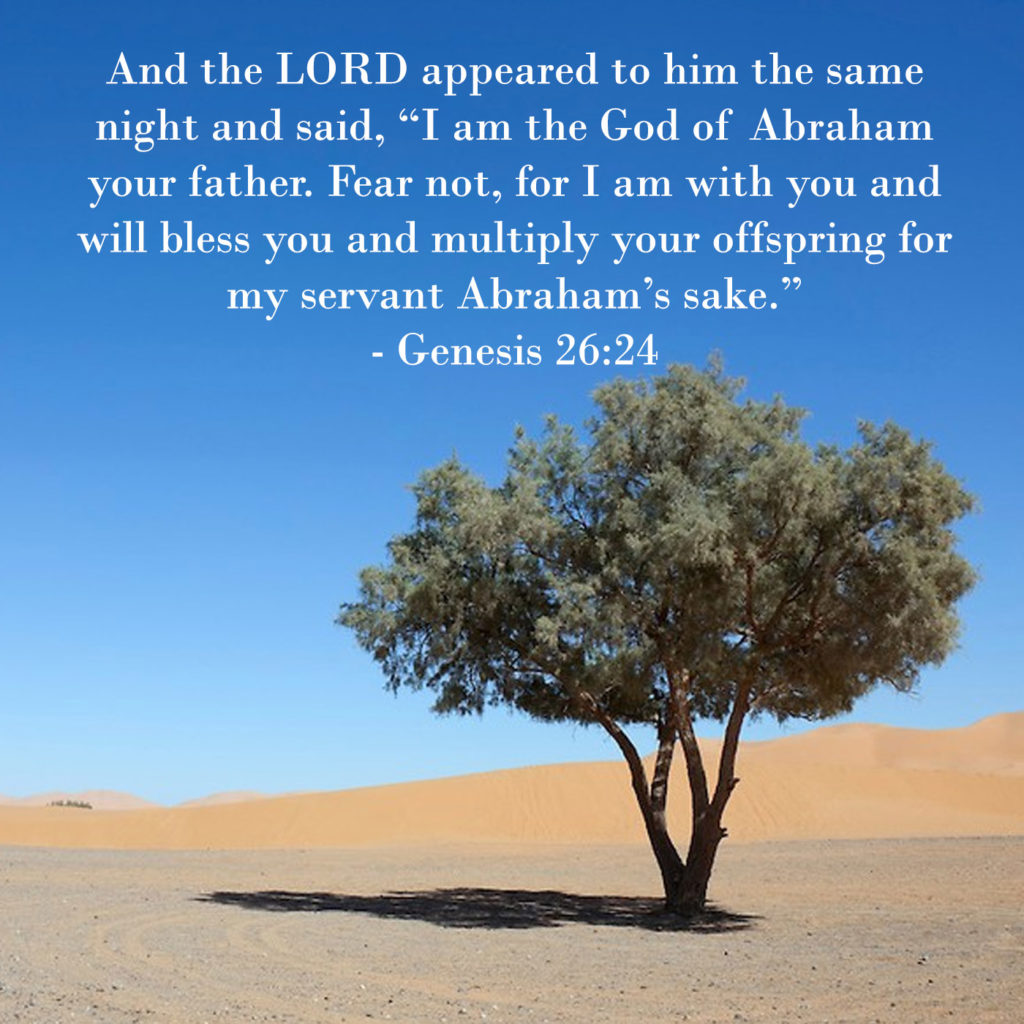
1 Now there was a famine in the land, besides the former famine that was in the days of Abraham. And Isaac went to Gerar to Abimelech king of the Philistines.
While Isaac’s sons are growing up, a famine descends on the land. Isaac seeks a place to continue to graze his flocks, ending up in Gerar, in the land ruled by Abimelech. Now Isaac likely knows who Abimelech is, as the king was friendly with Abraham, Isaac’s father. But there is no indication that Isaac and Abimelech had a good relationship.
2 And the LORD appeared to him and said, “Do not go down to Egypt; dwell in the land of which I shall tell you. 3 Sojourn in this land, and I will be with you and will bless you, for to you and to your offspring I will give all these lands, and I will establish the oath that I swore to Abraham your father. 4 I will multiply your offspring as the stars of heaven and will give to your offspring all these lands. And in your offspring all the nations of the earth shall be blessed, 5 because Abraham obeyed my voice and kept my charge, my commandments, my statutes, and my laws.”
It seems as though Isaac originally intended to do what Abraham did during famine, and sojourn in Egypt. However, God specifically tells him not to do this, and cites the covenant promises as reason enough for Isaac to stay. God has promised to bless him in this land, he need not go anywhere else. Notice that even though these promises apply to Isaac, they are specifically based on the obedience of Abraham, and the covenant God made with Abraham.
This is the first recorded time that God has spoken directly to Isaac, and it is done very similarly to how God spoke with Abraham. With this echo of God’s promises, it is clear that Isaac has fully inherited the covenant.
6 So Isaac settled in Gerar.
Isaac, like his father before him, obeys God’s word immediately.
7 When the men of the place asked him about his wife, he said, “She is my sister,” for he feared to say, “My wife,” thinking, “lest the men of the place should kill me because of Rebekah,” because she was attractive in appearance.
Also like his father, Isaac is afraid to call Rebekah his wife, for fear that the Canaanites would kill him. However, this time there is no half truth to hide behind, as Rebekah is not his half sister, as Sarah was to Abraham. This is an outright lie.
8 When he had been there a long time, Abimelech king of the Philistines looked out of a window and saw Isaac laughing with Rebekah his wife. 9 So Abimelech called Isaac and said, “Behold, she is your wife. How then could you say, ‘She is my sister’?” Isaac said to him, “Because I thought, ‘Lest I die because of her.’ ” 10 Abimelech said, “What is this you have done to us? One of the people might easily have lain with your wife, and you would have brought guilt upon us.” 11 So Abimelech warned all the people, saying, “Whoever touches this man or his wife shall surely be put to death.”
Isaac lie is found out, Abimelech himself notices Isaac being intimate with Rebekah. It is likely that Abimelech still remembers what happed when Abraham lived in his lands, and he nearly took Sarah as his wife. God nearly brought judgement upon his people. Now Isaac has done a similar thing, and Abimelech makes an official proclamation to protect Isaac and Rebekah so that they do not fall into judgement.
Notice that God protected Abraham and Sarah when this had happened before, by speaking to both Abimelech and Pharaoh. With Isaac however, God offers no such protection, possibly because no one tried to take Rebekah as a wife, or possibly because it was a lie.
12 And Isaac sowed in that land and reaped in the same year a hundredfold. The LORD blessed him, 13 and the man became rich, and gained more and more until he became very wealthy. 14 He had possessions of flocks and herds and many servants, so that the Philistines envied him.
God does however keep His promise to bless Isaac, and Isaac has a bountiful year reaping 100 times more than he had sown. This suggests that the famine was either not in Gerar, or had ended. It also provided the opportunity for Isaac to become increasingly wealthy, far more wealthy than Abraham had ever been. This causes tension between him and the people of Gerar, as they not only envy his wealth, but are likely concerned that he has become too powerful, and could take the land by force if he wanted to.
15 (Now the Philistines had stopped and filled with earth all the wells that his father’s servants had dug in the days of Abraham his father.) 16 And Abimelech said to Isaac, “Go away from us, for you are much mightier than we.”
Abimelech, noticing the tension between Isaac and his subjects, asks Isaac to leave. From later in the chapter, we learn that this might not have been a nice coversation, as Isaac later says “you hate me.” Perhaps Abimelech brought armed men to force Isaac out of his land.
17 So Isaac departed from there and encamped in the Valley of Gerar and settled there.
Rather than conquer the land that God had promised to him, and take it by force, Isaac tries to make peace with his neighbors and leaves. He feels no need to take that which God had promised to give to him and his descendants.
18 And Isaac dug again the wells of water that had been dug in the days of Abraham his father, which the Philistines had stopped after the death of Abraham. And he gave them the names that his father had given them.
Isaac puts effort into digging the wells his father had dug. As the Canaanites, most likely out of spite for Isaac had stopped them up.
19 But when Isaac’s servants dug in the valley and found there a well of spring water, 20 the herdsmen of Gerar quarreled with Isaac’s herdsmen, saying, “The water is ours.” So he called the name of the well Esek, because they contended with him. 21 Then they dug another well, and they quarreled over that also, so he called its name Sitnah.
However, as Isaac dug the wells, the people of the land would come and claim them as their own. They would have small fights over some of these, such as the quarrel at Esek, which means “quarrel,” or the legal battel at Sitnah, which means “enmity” or “lawsuit.” Evidently Isaac ended up just moving on until he could find a well that his neighbors could not claim as their own.
22 And he moved from there and dug another well, and they did not quarrel over it. So he called its name Rehoboth, saying, “For now the LORD has made room for us, and we shall be fruitful in the land.”
Isaac did finally find a freshwater spring that his neighbors did not object to him having, and he blessed it and named it Rehoboth, which means “open land,”
23 From there he went up to Beersheba. 24 And the LORD appeared to him the same night and said, “I am the God of Abraham your father. Fear not, for I am with you and will bless you and multiply your offspring for my servant Abraham’s sake.” 25 So he built an altar there and called upon the name of the LORD and pitched his tent there. And there Isaac’s servants dug a well.
From Rehoboth Isaac traveled 20 miles back to Beersheba, where he had lived before, And God appeared to him, as He had done with Abraham. God again repeats his promises to Isaac. Isaac makes this place his home, and sets up an altar to worship God.
26 When Abimelech went to him from Gerar with Ahuzzath his adviser and Phicol the commander of his army, 27 Isaac said to them, “Why have you come to me, seeing that you hate me and have sent me away from you?”
Once Isaac is settled in Beersheba, he receives an unexpected visit from Abimelech and his chief adviser and military commander. Given the less then welcoming nature of Abimelech’s subjects in keeping Isaac from finding a place with fresh water, and the hostility of their last coversation, Isaac is on guard. He asks what they want, in a very confrontational manner.
28 They said, “We see plainly that the LORD has been with you. So we said, let there be a sworn pact between us, between you and us, and let us make a covenant with you, 29 that you will do us no harm, just as we have not touched you and have done to you nothing but good and have sent you away in peace. You are now the blessed of the LORD.”
Abimelech has recognized God’s blessing on Isaac, as it was on Abraham. He seeks now to renew the treaty he and Abraham had, That they would not do each other harm.
30 So he made them a feast, and they ate and drank. 31 In the morning they rose early and exchanged oaths. And Isaac sent them on their way, and they departed from him in peace.
Isaac agrees to the peace treaty. They have the customary feat to celebrate, before Abimelech and his men head back.
32 That same day Isaac’s servants came and told him about the well that they had dug and said to him, “We have found water.” 33 He called it Shibah; therefore the name of the city is Beersheba to this day.
Later that day Isaac’s servants find water in their current location. Having just made an oath, Isaac knows there will be no quarrel over this well either. He names it Shibah, or “oath,” and thus the land comes to be known as “Beer-Shibah,” or “the well of the oath.”
34 When Esau was forty years old, he took Judith the daughter of Beeri the Hittite to be his wife, and Basemath the daughter of Elon the Hittite, 35 and they made life bitter for Isaac and Rebekah.
During all of this time, Jacob and Esau have been growing older, at age 40 Esau marries two Canaanite women. By this time Isaac is nearly 100 years old, and neither he nor Rebekah like Esau’s new brides. They are of a different heritage, worship different gods, and might not even speak the same language. They are not ideal brides for someone who might inherit the covenant. And his brother, Jacob, knows it.
